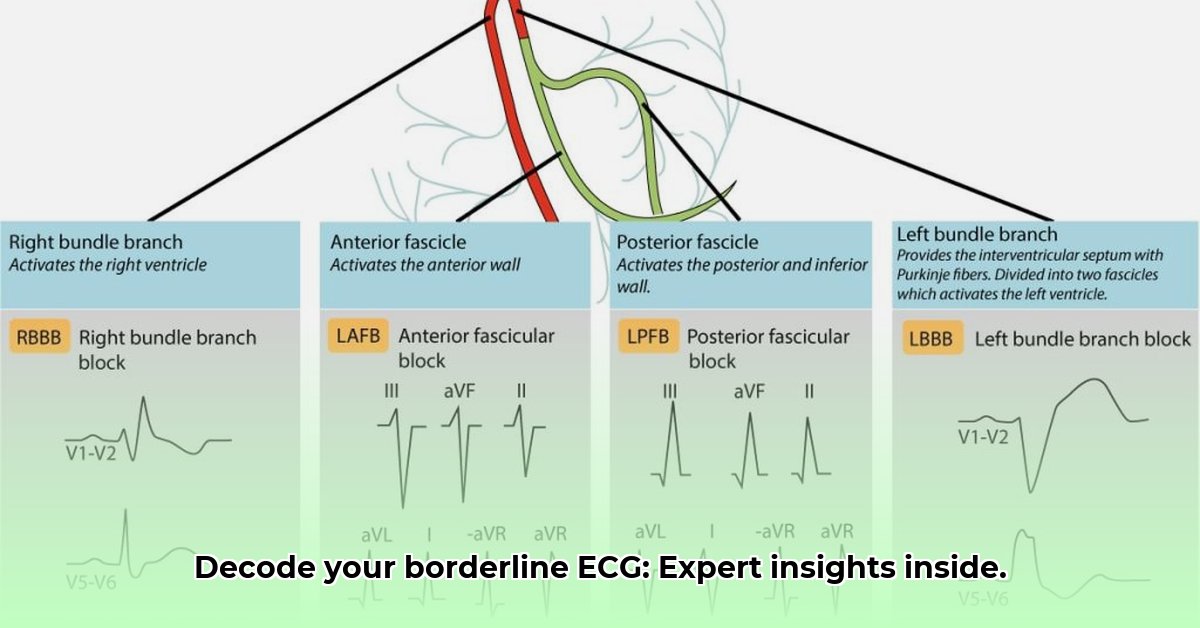That “borderline” ECG result can be concerning, leaving you wondering about its meaning and necessary actions. This guide aims to clarify borderline ECGs, explain their implications for your heart health, and outline the steps you should take, whether you’re a patient or a healthcare provider. We’ll explore how cardiologists interpret these results and offer advice to help you understand and manage your heart health, promoting confidence in your heart’s condition. For more in-depth information, see this helpful resource on borderline ECGs.
Borderline ECG Prognosis: Navigating Uncertainties and Heart Health
So, your ECG results are back, and they’re labeled as “borderline.” What does this signify? It’s normal to feel confused. A borderline ECG doesn’t automatically indicate a serious heart problem but suggests the need for a closer examination. Your heart’s electrical signals may have shown minor inconsistencies warranting further investigation for accurate diagnosis.
Decoding the “Borderline” ECG: Understanding What It Really Means
A “borderline” ECG means the results are not perfectly normal, but they do not clearly point to a specific heart condition either. Your heart’s rhythm or electrical activity displayed slight irregularities. These inconsistencies could stem from temporary mineral imbalances, harmless heartbeat variations, reactions to ingested substances, or even stress. While it could indicate something more serious, that’s why further tests are essential.
Interpreting an ECG involves more than just reading lines on paper. Doctors must consider various factors beyond the ECG itself to get a complete and accurate picture of your heart health and potential cardiovascular conditions.
- Your Symptoms: Have you experienced chest pain, shortness of breath, dizziness, palpitations, or fatigue? These symptoms can provide important clues about your heart’s condition.
- Your Medical History: Does heart disease run in your family? Do you have conditions like high blood pressure, high cholesterol, diabetes, thyroid disorders, or a history of rheumatic fever? Such factors can impact your heart’s health.
- Your Lifestyle: What are your eating habits, exercise routine, stress levels, and alcohol and tobacco use? Lifestyle choices significantly influence your heart’s well-being. Consider also exposure to environmental toxins.
- Current Medications and Supplements: Certain medications, including over-the-counter drugs and herbal supplements, can affect ECG readings.
Even minor factors like electrode placement during the ECG can affect the results, thus a thorough evaluation is vital in borderline ECG interpretation.
Next Steps: A Clear Path Forward After a Borderline ECG
Receiving a borderline ECG result doesn’t mean living with indefinite uncertainty. Here’s a clear path to follow for diagnostic accuracy and proper care:
- Consult Your Doctor: Schedule a follow-up to discuss your ECG results and any symptoms. Do not hesitate to ask questions to fully understand your health status. Be prepared to provide a detailed medical and family history, as well as information about your lifestyle and any medications or supplements you are taking.
-
Further Investigations: Your doctor may recommend additional tests to clarify your heart’s health, such as:
- Repeat ECG: To rule out technical errors or temporary rhythm variations.
- Holter Monitor: A portable ECG that records your heart’s rhythm over 24-48 hours (or longer) to detect intermittent abnormalities.
- Echocardiogram: An ultrasound of the heart to assess its structure and function.
- Stress Test: To monitor your heart’s response to exercise and detect any signs of ischemia (reduced blood flow). Several types exist, including treadmill, bicycle, or pharmacological stress tests.
- Cardiac CT or MRI: Advanced imaging techniques to visualize the heart and blood vessels in detail.
- Blood Tests: To check cholesterol levels, electrolytes, thyroid function, and other markers of heart health.
- Lifestyle Adjustments: Focus on a balanced diet, regular exercise, stress management, and avoiding smoking to support overall heart health and improve future tests.
- Symptom Observation: Pay close attention to your body and report any new or worsening symptoms, such as chest pain, shortness of breath, dizziness, palpitations, or unexplained fatigue, to your doctor immediately. Keep a detailed symptom log to share with your physician.
- Long-Term Strategy: Collaborate with your doctor to create a long-term plan with regular check-ups and necessary care adjustments based on ongoing heart monitoring. This may involve periodic ECGs, lifestyle modifications, or medication, depending on the underlying cause of the borderline result.
Working Together: A Collaborative Approach to Heart Health
Remember, a borderline ECG result is not a life sentence but a signal to investigate further and proactively manage your heart health. Your doctor and potentially a cardiologist are your partners in this process, necessitating open communication and active participation understanding your results and following recommendations.
According to the American Heart Association, proactive management and regular monitoring can significantly improve heart health outcomes.
The Role of Technology: AI in ECG Interpretation
Artificial intelligence (AI) enhances ECG interpretation but should not replace doctors. AI algorithms are helpful, but they’re not perfect and can’t account for all nuances of individual health situations. Your doctor integrates AI findings with your symptoms, medical history, and lifestyle to make the best recommendations for comprehensive cardiovascular care. This includes considering factors such as age, sex, ethnicity, and other medical conditions.
Action Plan: Defining Roles for Optimal Care
| Stakeholder | Short-Term Actions | Long-Term Actions |
|---|---|---|
| Patient | Schedule follow-up; discuss lifestyle changes; report any new symptoms; maintain a symptom log; ask questions and seek clarification; adhere to recommended testing and treatment. | Maintain healthy habits; regular check-ups; continue recommended testing and treatment; educate yourself about heart health and potential risks; manage stress effectively. |
| Primary Care Physician | Comprehensive review of results; order further tests; clear explanations; refer to a cardiologist if needed; consider patient’s medical history and risk factors. | Ongoing care plan; monitor progress; adjust treatment as needed; stay up-to-date with current guidelines; coordinate care with specialists. |
| Cardiologist | Expert interpretation; guide testing and treatment; provide specialist care; assess complex cases; offer advanced diagnostic and therapeutic options. | Research advancements; refine diagnostic guidelines; improve ethical AI integration; educate other healthcare professionals; participate in clinical trials. |
Navigating a borderline ECG depends on teamwork, open communication, and proactive heart health management. Don’t hesitate to ask questions – your involvement ensures the best possible outcome. Remember, knowledge is power and empowers you to have a healthy, strong heart.
How to Interpret Borderline ECG Results and Next Steps for Patients
Key Takeaways:
- A borderline ECG signals the need for further evaluation, not an immediate diagnosis.
- Many factors, like lifestyle or technical issues, can cause borderline results.
- Your doctor considers your medical history and symptoms during interpretation.
- Additional tests might be necessary to determine the underlying cause of the borderline results.
- Adopting and maintaining a healthy lifestyle can contribute to improved cardiac function.
What Does a Borderline ECG Mean for Heart Rhythm Analysis?
An ECG is like a snapshot of your heart’s electrical activity. A borderline result means the snapshot shows minor deviations from a normal pattern, requiring a closer look similar to a subtle hint, not a definitive diagnosis to rule out heart arrhythmias. Borderline ECG results do not provide a clear “yes” or “no” answer to heart disease, prompting thorough investigation.
Factors like stress, dehydration, caffeine, and medications can temporarily affect your heart rhythm and electrical activity, leading to abnormalities on the ECG. Sometimes, the issue stems from technical aspects during the test, such as incorrect electrode placement, potentially leading to inaccurate heart rhythm analysis. Skin conditions or excessive hair can also affect electrode contact.
How to Interpret Borderline ECG Results: Importance of Contextual Cardiac Assessment
Interpreting borderline ECG results and determining the next steps depends on your unique health situation. Factors like age, sex, medical history, and symptoms are crucial. A small abnormality might be less concerning in a young, healthy person but warrant closer attention in an elderly individual experiencing chest pain. The physician will consider all this information during a cardiac assessment. Consider whether the patient is an athlete; they often have ECG variations.
Next Steps After a Borderline ECG Result: Essential Cardiac Monitoring
If you receive a borderline ECG result, the most important next step is discussing it with your doctor. They will review the ECG in the context of your overall health to determine if continuous cardiac monitoring is needed, asking about your symptoms and medical history.
Here’s what might happen next for heart condition diagnosis:
- Repeat ECG: A repeat ECG can clarify uncertainties caused by minor technical errors. Ensure proper skin preparation and electrode placement.
- Holter Monitor: A portable ECG device worn for 24 hours or longer to record electrical activity. Keep a diary of activities and any symptoms experienced while wearing the monitor.
- Echocardiogram: An ultrasound test to create images of your heart, assessing its structure and function.
- Stress Test: Measures your heart’s response to exercise to identify heart conditions. Follow pre-test instructions regarding medication and food intake.
- Blood Tests: Detects electrolyte imbalances affecting your heart rhythm. Fasting may
- Top Rated Meditation Books to Deepen Your Practice - February 5, 2026
- Good Mindfulness Books For A Calmer, Happier Everyday Life - February 4, 2026
- Recommended Meditation Books for Beginners and Experienced Practitioners - February 3, 2026
















